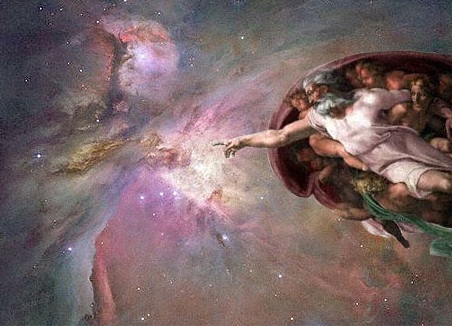 By recommendation from Dr Ann Christie at York St John University and inspired from a lecture I attended yesterday regarding how theology can help us understand the environmental crises we now face, it is to an extension of a previous article I wrote¹ that I turn this afternoon. The theologian at the centre of discussion in the lecture was an American eco-feminist named Sallie McFague; her approach to theology was, at first, something I actually sympathised with! She’s in favour of the use of metaphor in theological discourse which, as those of you who are familiar with my theological position will know, I favour considerably! She also appears in favour of a stronger involvement by the Church to engage the population with [ecological] issues affecting the world², as well as the encouragement for the possibility of numerous models of God. It is this aspect of her work at which I begin to find flaws. Firstly and, perhaps a little nit-picky of me – it strikes me as hypocritical that she is in favour of allowing for multiple and simultaneously co-existent models of God, but yet comes from a feminist perspective and so without question, has a particular agenda of the promotion of her own model of God. The second point, which will be the focus of this article, is her criticism of the ‘deist’ model of God. I shall now discuss her critique of this model, as well as attempt to provide a coherent response and thus defence of deism, the model of God in which I place my belief.
By recommendation from Dr Ann Christie at York St John University and inspired from a lecture I attended yesterday regarding how theology can help us understand the environmental crises we now face, it is to an extension of a previous article I wrote¹ that I turn this afternoon. The theologian at the centre of discussion in the lecture was an American eco-feminist named Sallie McFague; her approach to theology was, at first, something I actually sympathised with! She’s in favour of the use of metaphor in theological discourse which, as those of you who are familiar with my theological position will know, I favour considerably! She also appears in favour of a stronger involvement by the Church to engage the population with [ecological] issues affecting the world², as well as the encouragement for the possibility of numerous models of God. It is this aspect of her work at which I begin to find flaws. Firstly and, perhaps a little nit-picky of me – it strikes me as hypocritical that she is in favour of allowing for multiple and simultaneously co-existent models of God, but yet comes from a feminist perspective and so without question, has a particular agenda of the promotion of her own model of God. The second point, which will be the focus of this article, is her criticism of the ‘deist’ model of God. I shall now discuss her critique of this model, as well as attempt to provide a coherent response and thus defence of deism, the model of God in which I place my belief.
The first task at hand is to establish what is meant by ‘deism’. If you have read my previous article “Why God Exists” (2012) then you may already have an understanding of this term. If not, then let me refer to John Bowker’s Oxford Dictionary of World Religions, the book that has undoubtedly got me through 98% of my degree. Following the Enlightenment during the 18th Century, deism emerged as a view of God who “initiated creation and donated its laws, but then allowed it to pursue its own course”³. So put simply, God – in Aquinian and Aristotelian terms – is the first cause of everything; it is the primary causing agent of everything and after the original creation event, God’s interaction with the world on an immanent level ceased. Sallie McFague claims this view is “flat and uninteresting as well as non-Christian”⁴. The following discussion will deal with this claim.
Coming from a liberal framework, I place emphasis on the use of reason when constructing any form of theology; theological enquiry has to be relevant and contextual, it has to make allowances for the knowledge of the world humans have attained through the means of scientific investigation and if needs be, any subsequently outdated theologies must either be rethought or in some cases, abandoned completely. Sallie McFague, at the beginning of her discussion of deism, acknowledges that this is a positive element of the deist model of God:
The model has the advantage of freeing science to investigate the world apart from divine control…
(McFague 2008: 66)
The similarities between McFague and I are short-lived, as she goes on to claim that within a deist framework, God is “banished from the world” and is separated “most thoroughly” more than in any other of the models she discusses within her book. She goes on to suggest that deism is a:
…convenient view for those who want to ‘keep religion out of business and politics’, for those who do not wish a God who immanent within creation and cares about its well-being.
(McFague 2008: 66)
Is this not the whole point of deism?! How can it be reasonably justified to critique a framework on the basis upon which it exists? Deism exists as a framework or model of God to make obsolete the idea of an immanent supernatural being, which perhaps poses the biggest challenge to faith seen in the modern world. When in conversation with atheists or non-believers, the majority of their objection comes in the form of challenge to the traditional concepts of God that are seen in the Old and New Testaments; a, to use McFague’s own description, “compassionate, suffering and always-present” deity is something that most people in the modern world find difficult to place belief in – the advances in science and technology have almost rendered the existence of such a being implausible. Deism does not deny the existence of God, more it challenges the traditional Juedo-Christian concepts of it in light of scientific advancements and discovery.
McFague challenges the notion that the deistic view of God is Christian in any way. I ask this: what does it mean to be Christian? Belief in God? The acknowledgement and following of Jesus’ example and ministry? The caring and love for all humanity? I urge you to watch this: What Can Religion Learn from Atheism. Despite David Patterson not believing in God, which for this argument is not all that useful, we can still gain a more wholesome understanding of what it means to be Christian. It is not rooted in belief in a supernatural being in the sky who is active and present within the world, nor is it grounded in the belief that a human was either born or became divine; both of these assumptions are irrelevant for the modern day. How can I, a young adult living in the 21st Century relate to, or come to an understanding of such things?
What deism provides, is a way of understanding how everything came into existence and a way of understanding something of the nature of God, in a world where we now know that our being here is the result of a long process of genetic mutation, where we know that the planet on which we reside is nothing but a single grain of sand in an infinitely expanding universe. Deism thus, presents Christianity as a “rational and moral religion, easily harmonised with human reason”⁵; and thus we return to one of my opening statements; the importance of reason.
McFague continues her critique of deism by making reference to environmental issues; she attempts to promote a panentheistic view of the world (that is, the “world as God’s body”) which in turn, she interprets as our duty to look after and care for the planet. Obviously, the deistic view stands in stark contention with this. The planet as already described is nothing but a tiny insignificant speck on the vast black canvas of the universe, God is not ‘of’ or ‘in’ or ‘part of’ the planet. Earth, as well as all the other thousands if not millions of planets are in existence because of the initial act of creation at the beginning of time. Nothing more. Nothing less. We shouldn’t look after our planet because it is some way an essence of God’s being, we should look after it because it is in our best interests to look after and care for it. We all know if we carry on the way we are, our existence here will be short-lived indeed.
If you want to gain a more wholesome understanding of my position on the existence of God, as already suggested, Why God Exists would be good to read. In conclusion, there will always be those theologians who wish to preserve the mysticism and myth surrounding Christianity, and there will be those who want to attempt to make it more accessible and understandable for a 21st Century population. Both must be treated with respect, however I will always defend and argue for the continual progression and evolution of religion. It is an integral part of life and should not be left alone to fall victim to the challenges posed by modern scientific and technological advances.
As always, comment and discussion is welcome!
Thank you for reading.
References
¹ See Roberts, C (2012) Why God Exists. Available at: https://www.clarkeroberts.co.uk/2012/09/28/why-god-exists/
² McFague, S (2008) A New Climate for Theology: God, the World and Global Warming Minneapolis, MN: Fortress Press. 36.
³ Bowker, J (2004) The Oxford Dictionary of World Religions Oxford: Oxford University Press. 267.
⁴ McFague, J (2008) A New Climate for Theology: God, the World and Global Warming Minneapolis, MN: Fortress Press. 65.
⁵ McGrath, A (2011) Christian Theology: An Introduction Chichester: Wiley-Blackwell

Cherish Bere liked this on Facebook.
i do think u have a lot of excellent points although i will always argue we haven’t evolved due to mutation…i do think evolution is possible and probably has and does happen but i don’t think it is the first causation. Until next time…..